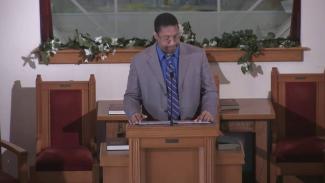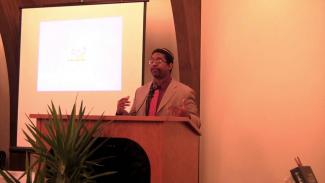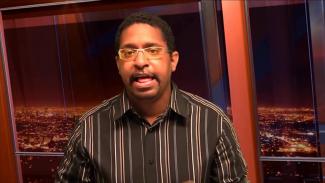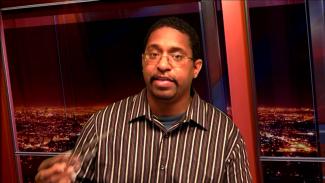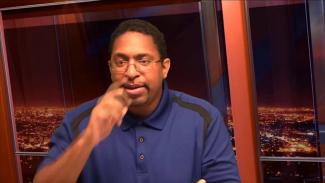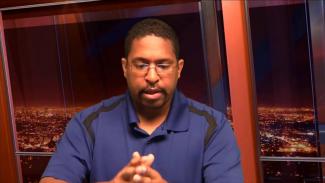John Spellman speaks on Luke 17, focusing on the 10 lepers whom Jesus healed. Of these 10 lepers only 1, a Samaritan, returned to glorify God. What can we learn from this powerful story about our relationship with God. Are we like the 9 lepers who never returned? Or are we like the one that glorified God?
Topic: Jesus: Lessons and Parables
To see more broadcasts select show names, a year, or all video media.How are Christians supposed to wait for the second coming of Jesus? What does this waiting time look like? Should they do nothing and be passive as they wait for the master, or are Christians called to do something? What is God’s mission and purpose for the church awaiting His return? What does repentance, revival, reformation, faith, and works have to do with our waiting experience? How did Jesus describe our responsibilities in his farming parables? In what ways do our roles differ and what should be our attitude toward sowing, reaping, and nurturing?
Christians are to seek the peace and prosperity of the cities we live in. How does this peace and prosperity help our mission? How did Paul minister to the needs of the various ethnic groups, cultures, personalities, and languages of his time? Is God really concerned with the hurting and suffering of humanity? What impact should the suffering of others have on believers? What are the different ways people may respond to the gospel and how can the church respond? How did the parable of the sower relate to our end time mission to reach the cities of the world?
Have you ever felt like God was too late? Have you ever had a delay in your answer to prayer? If God loves us, why doesn't He always answer requests right away? When Lazarus died because Jesus was delayed for two days, they might have had similar questions. Jesus taught them a powerful lesson about what happens when people think God is too late. John Spellman preaches at the Beit Shalom SDA Congregation.
How did Jesus lead people to follow Him? How can we do the same today? Does God use flawed people to draw people to Jesus? What role does the church play in bridging the gap between humanity and God? How does God speak to people today? How can we discern the voice of God amid all the other voices which compete for our attention? How does the story of Zacchaeus show that God is often seeking out us when we think it’s difficult for us to seek him? Is God still reaching out to people today? Should we be passive or active in reaching people?
How did Jesus win the confidence of people who came in contact with Him? How should the church do the same today? What does confidence mean? What are Biblical examples of confidence and lack of confidence in God? Why is there a great danger in placing too much confidence in people? Is the Church perfect? What are some dangers in placing too much confidence even in church members? How can we point people to Christ in an church that is not perfect? How does God bring people into favor with Him and with others? Why are traits like integrity so important?
How did Jesus minister to people's needs? How did He know their needs? How did Jesus show respect to people he wanted to help? How can we show genuine care and concern for those we seek to help today? Is it appropriate to ask how we can help? Does God ever force His help on us? What do you do when plans to help or to minister get interrupted by the unexpected? Why is it so important for Christians to love one another? How did Dorcas exemplify this and what impact did her love for people have on her ministry? What are the different ways we can approach ministry?
How did Jesus show sympathy, compassion, mercy, empathy, pity, and genuine concern for people during the course of His earthly ministry? How can Christians do the same in the world we live in today? Is the God of the Old Testament less compassionate than the God of the New Testament? How can we understand God's compassion in acts of judgment? What does the Old Testament show us about God's reaction to human suffering? Does God ignore human suffering, or does it impact Him? Why is it important for Christians to learn to walk in the shoes of others?
Jesus mingled with people and genuinely desired their good. What message does this have for the church today? How can we genuinely desire the good of others? How does scripture contrast how Jesus cared about people compared to His disciples or prophets like Jonah? How did Jesus treat people who were sick and out-casted? Why did some healings Jesus did occur in more than one stage? What does the Bible teach about selfishness, loving others, and the needs of our neighbors? How does this compare with the deeds of many professed Christians throughout history?
This week we are joined by Dr. May-Ellen Colon and Dr. Gaspar Colon as we discuss Jesus on the topic of community outreach. What did Jesus have to say about community outreach? How did Jesus view the church's role in terms of reaching out to those in spiritual darkness? Who is our neighbor? What did He mean by the metaphors of light and salt? What roles do different members within the church play in reaching outsiders? How does the farming analogy illustrate these different roles? How do we prepare the soil, sow the seed, nurture the crop, and reap the harvest?
Have you ever been asked to do something by a friend or family member that you didn't want to do? Have you eve been asked to do something and, although you didn't want to do it, you couldn't say no? Have you ever said you were going to be somewhere and purposely didn't show up? This sermon is about doing God lip service. There are times when we say things we don't mean and honor God with words, but we don't follow through with action. What kind of service does God expect from His people? This sermon talks about sanctification, God's power to transform our lives, and how to avoid hypocrisy.
What is the significance of Jesus' crucifixion and resurrection? Why did the veil in the temple rip? What did Jesus mean when He cried out "My God, My God why have you forsaken me?" What did it mean for Jesus to be separated from the Father? What similarities do we hold to Barabbas? Did the crucifixion really happen? How does secular history evidence this event? What does the resurrection mean for believers and why is it the basis of our faith? What did Jesus commission us to do in response to His salvation?

